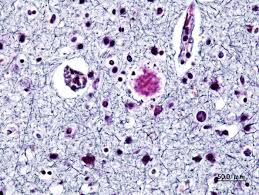Coffee grounds can be a valuable source of organic matter and nutrients for plants.
When used properly and in moderation, coffee grounds can be a valuable addition to your garden, contributing to soil fertility and plant health.
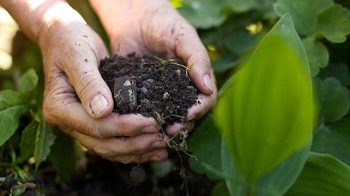
What are coffee grounds?
Coffee grounds are the remnants of brewed coffee after the brewing process. They are the finely ground particles that are left behind in the coffee filter or coffee maker.
Coffee grounds are usually dark brown or black in color and have a rich, earthy aroma. They consist of the solid residues of coffee beans, which contain various organic compounds, oils, and nutrients.
They contain essential elements like nitrogen, potassium, and phosphorous that support healthy growth. Additionally, coffee grounds can improve soil structure, retain moisture, and promote beneficial microbial activity. However, it’s important to use them in moderation, as excessive amounts can alter soil pH levels.
You might also like to read: How to choose the best coffee beans?
How to compost coffee grounds?
Composting coffee grounds is a great way to recycle them and turn them into nutrient-rich compost for your plants. Here’s a step-by-step guide on how to compost coffee grounds:
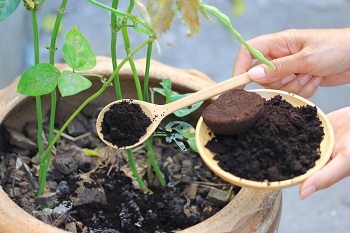
- Collect coffee grounds: Save your used coffee grounds in a container. You can accumulate them over a few days or weeks until you have enough to add to your compost pile.
- Prepare your compost pile or bin: Choose a suitable location for your compost pile or set up a compost bin in your backyard. Make sure it’s well-drained and has a good mix of browns (carbon-rich materials) and greens (nitrogen-rich materials).
- Add coffee grounds to the compost: When adding coffee grounds to your compost, it’s important to mix them with other compostable materials. Coffee grounds are considered green material, so balance them out with brown materials like dry leaves, straw, shredded newspaper, or cardboard. Aim for a ratio of roughly 3 parts brown materials to 1 part green materials.
- Mix and layer: Add a layer of brown material to your compost pile or bin, followed by a layer of coffee grounds. Repeat this layering process, alternating between browns and greens, until you’ve added all the coffee grounds and other compostable materials. Mixing or turning the compost pile occasionally helps with aeration and decomposition.
- Maintain moisture and airflow: Keep your compost pile moist, similar to a damp sponge. If it gets too dry, sprinkle some water to maintain the right moisture level. Ensure proper airflow by turning or mixing the compost periodically to prevent it from becoming compacted.
- Wait for composting to occur: Depending on various factors like temperature, moisture, and the mix of materials, composting can take several months to a year. During this time, microorganisms will break down the organic matter, including the coffee grounds, into rich, dark compost.
- Use the finished compost: Once the composting process is complete, the compost will be crumbly, dark, and have an earthy smell. You can then use this nutrient-rich compost to improve your garden soil, as a top dressing for plants, or as a component in potting mixes.
By following these steps, you can effectively compost coffee grounds and contribute to the recycling and repurposing of organic waste in your garden.
The many uses of coffee grounds in the garden
Coffee grounds have several uses in the garden beyond composting. Here are some common ways to utilize coffee grounds effectively:
- Fertilizer: Coffee grounds contain nitrogen, phosphorous, and potassium, which are essential nutrients for plant growth. Sprinkling coffee grounds around your plants or mixing them into the soil can provide a slow-release fertilizer that nourishes your plants over time.
- Soil amendment: Coffee grounds can improve soil structure and drainage. They add organic matter to the soil, enhancing its water-holding capacity and promoting aeration. Mix coffee grounds into the soil or incorporate them into compost to boost its nutrient content and overall quality.
- Pest deterrent: Coffee grounds have been found to repel certain garden pests like slugs, snails, and ants. Creating a barrier of coffee grounds around susceptible plants can discourage these pests from reaching them.
- Acid-loving plants: Coffee grounds are slightly acidic, making them ideal for plants that prefer acidic soil conditions. Acid-loving plants such as azaleas, rhododendrons, blueberries, and camellias can benefit from the pH-lowering effects of coffee grounds. Apply them as a mulch around the base of these plants.
- Vermicomposting: Coffee grounds are an excellent addition to vermicomposting systems. Red worms (Eisenia fetida), commonly used in vermicomposting, thrive on coffee grounds and produce nutrient-rich worm castings, or vermicompost, which can be used as a potent fertilizer.
- Seed germination: Coffee grounds can aid in seed germination by providing a loose, well-draining medium. Mixing coffee grounds with seed-starting mix or sprinkling them lightly on top of the soil can help improve germination rates for certain seeds.
- Indoor plant care: Indoor plants can benefit from coffee grounds as well. Adding coffee grounds to potting soil can improve its structure and water retention. However, be cautious not to overdo it, as excessive amounts of coffee grounds can lead to over-acidity.
Remember to use coffee grounds in moderation and consider the specific needs of your plants. It’s always a good idea to observe how your plants respond and make adjustments accordingly.
Are coffee grounds good for plants?
Yes, coffee grounds can be beneficial for plants when used appropriately. Here are some reasons why coffee grounds are considered good for plants:
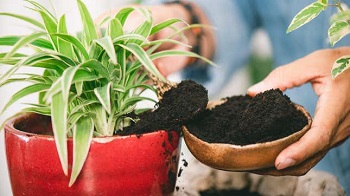
- Nutrient source: Coffee grounds contain essential nutrients like nitrogen, phosphorus, potassium, calcium, and magnesium. These nutrients are important for plant growth and development. When added to the soil, coffee grounds can provide a slow-release source of nutrients, enriching the soil and benefiting plants.
- Organic matter: Coffee grounds are rich in organic matter, which improves soil structure and fertility. Organic matter helps to retain moisture in the soil, promotes aeration, and supports the growth of beneficial soil microorganisms. This can enhance overall soil health and plant growth.
- pH effect: Coffee grounds are slightly acidic, and some plants prefer acidic soil conditions. Acid-loving plants like azaleas, rhododendrons, blueberries, and camellias can benefit from the pH-lowering effect of coffee grounds when used as a soil amendment around their base.
- Pest repellent: Coffee grounds can act as a natural deterrent for certain pests. Slugs, snails, and ants, for example, are repelled by coffee grounds. Placing a barrier of coffee grounds around plants can help keep these pests away.
However, it’s important to note that coffee grounds should be used in moderation and with caution. Excessive amounts of coffee grounds can alter soil pH levels too much, potentially affecting plant health.
Additionally, some plants may not tolerate acidic soil conditions, so it’s crucial to consider the specific needs of your plants before applying coffee grounds.
You might also like to read: Does drinking coffee regularly have a positive effect on your health?
Are coffee grounds harmful to plants?
Coffee grounds are generally not harmful to plants when used in moderation and following proper guidelines. However, there are a few considerations to keep in mind:
- pH levels: Coffee grounds are slightly acidic, and some plants may not tolerate highly acidic soil conditions. While acid-loving plants can benefit from coffee grounds, it’s important to avoid excessive application, which can significantly lower the pH of the soil beyond what is favorable for most plants.
- Nitrogen imbalance: Coffee grounds are relatively high in nitrogen, which is an essential nutrient for plants. However, an excessive concentration of nitrogen can cause an imbalance and potentially harm plants. It’s crucial to use coffee grounds in moderation and ensure they are mixed with other compostable materials to maintain a balanced nutrient profile.
- Moisture and compaction: Coffee grounds can retain moisture, which can be beneficial for plants, but excessive moisture retention can lead to waterlogging and root rot. It’s important to incorporate coffee grounds into the soil or mix them with other materials to prevent excessive compaction and improve drainage.
- Fungal growth: Coffee grounds are organic materials that can promote fungal growth if directly applied to plant stems or foliage. It’s best to avoid direct contact with plant tissues to minimize the risk of fungal infections.
To avoid potential issues, it’s advisable to monitor the response of your plants when using coffee grounds and adjust the application accordingly.
Every plant is different, so it’s essential to consider the specific needs and preferences of your plants before using coffee grounds. If you notice any negative effects, such as leaf yellowing or stunted growth, it may be necessary to discontinue or reduce the use of coffee grounds.
Summary
Coffee grounds can be beneficial for plants when used properly. They contain nutrients and organic matter that can enhance soil fertility, improve moisture retention, and support beneficial microbial activity.

Coffee grounds can also provide a slight acidity that benefits acid-loving plants.
However, it’s important to use them in moderation and avoid excessive application, as high acidity or nitrogen levels can harm plants. Additionally, coffee grounds should not come into direct contact with plant tissues to prevent fungal growth. By following guidelines and observing plant responses, coffee grounds can be a valuable addition to your gardening routine.
FAQ’s
Q1: What plants like coffee grounds?
Coffee grounds are particularly favored by acid-loving plants that thrive in slightly acidic soil conditions. Some examples of plants that benefit from coffee grounds include azaleas, rhododendrons, blueberries, camellias, hydrangeas, and roses. These plants appreciate the acidity provided by coffee grounds and can thrive when the grounds are used as a soil amendment or incorporated into compost.
It’s important to monitor the plants’ response and adjust the application according to their specific needs, as individual plant preferences can vary
Q2: What plants don’t like coffee grounds?
Some plants are not particularly fond of coffee grounds due to their acidity or other characteristics. Plants that prefer alkaline soil conditions, such as asparagus, beets, spinach, geraniums, and marigolds, may not thrive with coffee grounds.
Additionally, plants that require well-draining soil, such as cacti, succulents, rosemary, and lavender, may be adversely affected by the moisture-retaining properties of coffee grounds.
Furthermore, young or sensitive plants may not tolerate the presence of caffeine found in coffee grounds. It’s essential to consider the specific needs and preferences of your plants and, if in doubt, perform a small-scale test before widespread application.
Q3: Can I compost coffee grounds with other food waste?
Yes, coffee grounds can be composted along with other food waste. Coffee grounds are considered a green or nitrogen-rich material, similar to fruit and vegetable scraps, tea leaves, and grass clippings.
To create a balanced compost pile, it’s important to mix coffee grounds with brown or carbon-rich materials such as dry leaves, shredded newspaper, or cardboard. The brown materials help maintain the carbon-to-nitrogen ratio necessary for proper composting.
By combining coffee grounds with other food waste and ensuring adequate aeration and moisture in the compost pile, you can effectively break down the organic matter and produce nutrient-rich compost for your plants.
Q4: Can I compost coffee grounds with lawn trimmings?
Yes, you can compost coffee grounds with lawn trimmings. Coffee grounds are considered a green or nitrogen-rich material, while lawn trimmings are typically categorized as a brown or carbon-rich material.
To create a balanced compost pile, it’s important to mix these materials in the right proportions. Aim for a ratio of roughly three parts brown materials (such as dry leaves, straw, or shredded newspaper) to one part green materials (like coffee grounds and lawn trimmings). This will provide the necessary carbon-to-nitrogen ratio for effective composting.
With proper aeration and moisture, the combination of coffee grounds and lawn trimmings can contribute to the production of nutrient-rich compost.
Q5: Can I compost coffee grounds with egg shells?
Yes, you can compost coffee grounds with eggshells. Both coffee grounds and eggshells are valuable additions to compost piles.
Coffee grounds provide nitrogen, while eggshells offer calcium and other minerals. When combined, they contribute to the nutrient profile of the compost.
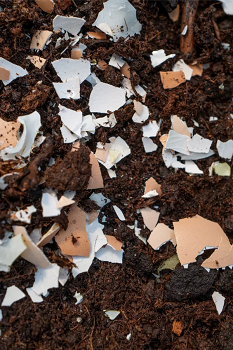
To compost them together, crush the eggshells into smaller pieces to aid decomposition and mix them with coffee grounds. It’s beneficial to balance these materials with carbon-rich components, such as dry leaves or shredded paper, to maintain a proper carbon-to-nitrogen ratio. With proper composting conditions, including sufficient moisture and aeration, coffee grounds and eggshells can contribute to nutrient-rich compost for your plants.
You might also like to read: Does coffee stunt your growth?


